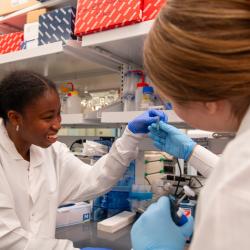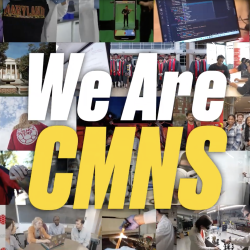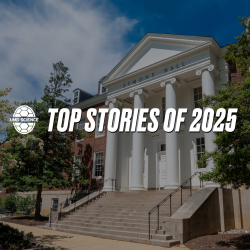John Fourkas Named SPIE Senior Member
Despite the challenges presented by COVID-19, John Fourkas’ accomplishments as a scholar and mentor continue to inspire. Fourkas, who is the Millard Alexander Professor of Chemistry at the University of Maryland, was named a Senior Member of SPIE, the International Society for Optics and Photonics. The designation is an honor that recognizes members for their professional experience, active involvement with SPIE and the optics community, as well as significant performance that sets them apart from their peers.

“It’s a great honor to be named a Senior Member of SPIE,” Fourkas said. “I’ve been increasingly involved with the organization over the years, and it’s nice to have those contributions recognized. I look forward to continuing to be a part of the society’s future initiatives.”
In his research, Fourkas uses ultrafast lasers and photolithography to probe, control and fabricate microscopic and nanoscale materials, both solids and liquids. Applications of his research include 3D printing of surfaces with specific features measuring as small as one-twentieth the wavelength of light. The tiny topography of these surfaces can influence the behavior of living cells such as immune cells and bacteria, which can be made to move, take on different shapes and respond differently to various inputs. This ability to manipulate cells with topography can be useful in studying complex cell functions and growing artificial tissues.
Fourkas is also developing improved methods for fabricating semiconductors and controlling fluids in three dimensions at microscales.
“To be named a Senior Member of SPIE is an important distinction that recognizes John’s leadership. He is really pushing the boundaries with his nontraditional optical approaches to micro- and nanofabrication,” said Janice Reutt-Robey, chair of UMD’s Department of Chemistry and Biochemistry. “We’re very proud of his extensive accomplishments in optical science, his active involvement with the optics community, and his outstanding mentoring of students and junior researchers,”
In his five years as a member of SPIE, Fourkas has served on conference program committees, chaired symposia in the U.S. and abroad, and helped guide a cadre of students and junior scientists in the optics community. Twenty-three students have earned their Ph.D. under Fourkas’ mentorship, and he is currently advising six more.
Over the years, Fourkas has demonstrated deep dedication to his students’ success, and when the pandemic hit in early 2020, he stepped in to help his students overcome unprecedented challenges to career navigation.
Just as the pandemic hit, Fourkas’ postdoctoral fellow, Nikolaos Liaros, was applying for academic positions, and many of the job opportunities available to him evaporated. With Fourkas’ support and encouragement, the Research Corporation for Science Advancement (RCSA), in partnership with the National Science Foundation (NSF), named Liaros a Cottrell Fellow. The fellowship will provide critical financial support for Liaros’ research and provide him with a mentored teaching experience.
“During the pandemic, the first thing that John did was to help me alleviate the funding uncertainty,” Liaros said. “As part of this, he brought to my attention the Cottrell Fellowship opportunity and sponsored my application.”
Fourkas is a 1997 Cottrell Scholar, a distinction awarded by the RCSA to honor and develop outstanding teacher-scholars who exhibit high-quality and innovative research programs and academic leadership skills. In response to the COVID-19 pandemic, the RCSA established a special Cottrell Fellowship in partnership with NSF to support a postdoctoral fellow who is sponsored by a Cottrell Scholar and whose plans to start an independent academic or research career in 2020 was delayed or derailed in the wake of the pandemic.
“The Cottrell Fellowship comes at an ideal time, allowing me to continue my research while I am pursuing the next step in my career,” Liaros said. “John has been the best mentor I could ever have for my postdoc. He has provided great guidance for my research, while he motivated me to expand my career interests and encouraged me to achieve my goals.”
Fourkas earned his bachelor’s and master’s degrees in chemistry from Caltech and his Ph.D. in chemistry from Stanford University. He was an NSF postdoctoral fellow at the University of Texas and MIT before joining the chemistry faculty of Boston College in 1994. Fourkas came to UMD from Boston College in 2005. In 2012, he received the University System of Maryland Regents’ Faculty Award for Scholarship.
Fourkas is a fellow of the American Association for the Advancement of Science, the American Physical Society and OSA (formerly the Optical Society of America).
Written by Kimbra Cutlip






